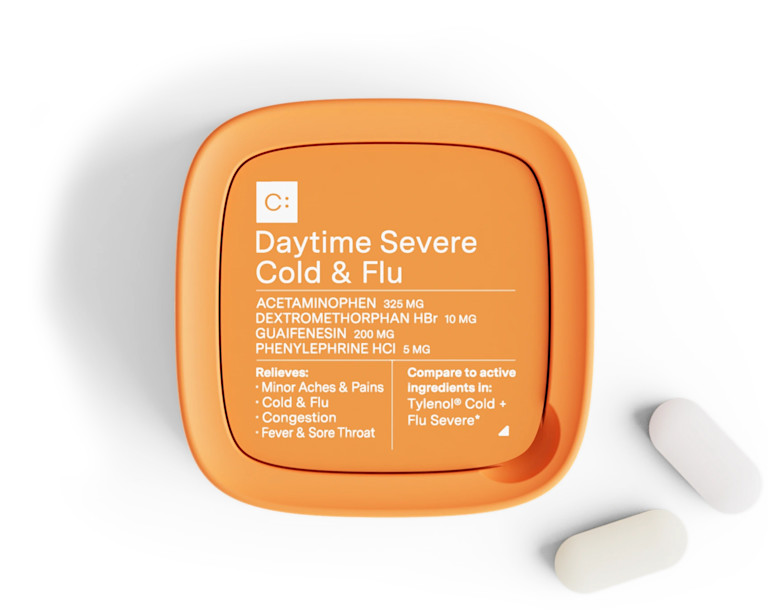If you've ever taken Dayquil to relieve your cold or flu symptoms, you may have wondered if it can keep you awake at night. There are many myths surrounding the popular over-the-counter medication, but it's time to separate fact from fiction. In this article, we'll explore the ingredients and purpose of Dayquil, delve into the science behind its potential impact on sleep, and ultimately debunk the myth of Dayquil keeping you awake.
Understanding Dayquil: Ingredients and Purpose
Before we can debunk the myth, let's first understand what Dayquil is and why people use it. Dayquil is a commonly used medication for treating symptoms associated with the common cold and the flu. It is designed to provide temporary relief from coughing, nasal congestion, sore throat, fever, and minor aches and pains.
Dayquil is a go-to choice for many individuals during the cold and flu season due to its effectiveness in managing these uncomfortable symptoms. It is important to note that while Dayquil can provide relief, it is not a cure for the common cold or the flu. It works by targeting specific symptoms to help individuals feel more comfortable while their body fights off the viral infection.
The Active Ingredients in Dayquil
The effectiveness of Dayquil lies in its active ingredients. The primary ingredients in Dayquil are acetaminophen, dextromethorphan, and phenylephrine.
Acetaminophen: Known for its pain-relieving and fever-reducing properties, acetaminophen helps alleviate the discomfort caused by the common cold or flu.
Dextromethorphan: This ingredient is a cough suppressant that helps to quieten an annoying cough, allowing you to rest easier.
Phenylephrine: Acting as a decongestant, phenylephrine helps relieve nasal congestion, making it easier to breathe.
These active ingredients work together to target different symptoms commonly experienced during a cold or flu, providing comprehensive relief for individuals seeking comfort during their illness.
The Purpose of Dayquil: Treating Cold and Flu Symptoms
Now that we've covered the ingredients, let's discuss the purpose of Dayquil. The ultimate goal of this medication is to provide relief from the symptoms that accompany colds and the flu. Dayquil does not cure the common cold or the flu, but it can help alleviate the discomfort associated with these illnesses, allowing you to continue with your daily activities.
By understanding how Dayquil works and the specific symptoms it targets, individuals can make informed decisions about using this medication to manage their cold or flu symptoms. It is always recommended to follow the instructions provided on the packaging or consult a healthcare professional for guidance on proper usage and dosage.
The Myth: Dayquil and Sleep Disruption
Now that we have a good understanding of Dayquil and its purpose, let's address the myth that it can disrupt your sleep. Many people believe that taking Dayquil can cause insomnia or sleep disturbances. But where did this myth originate, and is there any truth to it?
Dayquil is a popular over-the-counter medication known for its effectiveness in relieving symptoms of the common cold and flu. However, some individuals have expressed concerns about its potential impact on sleep patterns. This has led to the perpetuation of a myth that Dayquil can disrupt one's ability to get a good night's rest.
Where Did the Myth Originate?
The origins of the myth surrounding Dayquil and sleep disruption are shrouded in mystery. Speculation suggests that anecdotal experiences and misunderstandings about the medication may have contributed to the spread of this belief. It's essential to approach such claims with a critical eye and seek out reliable sources of information to separate fact from fiction.
Furthermore, the realm of health and wellness is often rife with misconceptions and myths, making it challenging for individuals to navigate the vast sea of information available to them. In the case of Dayquil and its purported link to sleep disturbances, it is crucial to delve deeper into the scientific evidence to uncover the truth behind these claims.
The Connection Between Dayquil and Sleep
While individuals may have personal experiences that suggest Dayquil can interfere with sleep, it's important to consult the available scientific evidence. According to medical experts, Dayquil generally does not contain any ingredients that directly cause sleep disturbances. The active ingredients in Dayquil, such as acetaminophen and dextromethorphan, are primarily targeted at alleviating cold and flu symptoms rather than disrupting sleep patterns.
Moreover, the impact of medications on sleep can vary from person to person, depending on factors such as individual sensitivity to certain ingredients or underlying health conditions. It is always advisable to consult a healthcare professional if you have concerns about the effects of Dayquil or any other medication on your sleep quality.
The Science Behind Dayquil and Sleep
Now, let's delve deeper into the fascinating world of Dayquil and its potential impact on sleep. By unraveling the intricate mechanisms through which Dayquil interacts with our bodies and influences our sleep patterns, we can gain a more profound insight into the validity of the age-old myth.
Dayquil, a popular over-the-counter medication, contains a combination of active ingredients designed to combat the symptoms of colds and flu. Upon ingestion, these components embark on a remarkable journey through your body. Acetaminophen, a potent pain reliever, works to lower fever and alleviate bodily aches, providing much-needed comfort during times of illness. Dextromethorphan, another key ingredient, acts as a cough suppressant, soothing those persistent coughs that often plague individuals with respiratory infections. Additionally, phenylephrine, a decongestant found in Dayquil, targets nasal congestion, allowing for easier breathing and improved airflow.
How Dayquil Affects the Body
When you take Dayquil, the active ingredients are absorbed into your bloodstream, where they travel throughout your body. Acetaminophen helps reduce fever and relieve pain, while dextromethorphan suppresses coughing. Phenylephrine works as a decongestant, reducing nasal congestion.
Despite its efficacy in alleviating cold and flu symptoms, Dayquil operates in a manner that respects the delicate balance of our sleep cycle. Unlike certain medications that contain stimulants capable of disrupting normal sleep patterns, Dayquil's formulation is carefully crafted to provide relief without causing significant interference with your body's natural rhythm.
The Impact of Dayquil on the Sleep Cycle
While Dayquil can alleviate cold and flu symptoms, it is crucial to note that it does not directly interfere with your sleep cycle. The active ingredients in Dayquil do not contain stimulants that would disrupt normal sleep patterns.
Debunking the Myth: Does Dayquil Really Keep You Awake?
Now that we have examined the evidence, it's time to debunk the myth and determine whether Dayquil truly keeps you awake.
Dayquil, a popular over-the-counter medication used to relieve symptoms of the common cold and flu, has been a subject of debate when it comes to its effects on sleep. While some individuals claim that Dayquil can keep them awake at night, the scientific evidence paints a different picture.
Analyzing the Evidence
Multiple medical sources confirm that Dayquil does not contain any ingredients known to disrupt sleep. Without the presence of stimulants, it is unlikely that Dayquil would prevent you from falling asleep or staying asleep.
Furthermore, the active ingredients in Dayquil, such as acetaminophen, dextromethorphan, and phenylephrine, are not typically associated with causing insomnia or sleep disturbances. These ingredients work to alleviate cold and flu symptoms without directly impacting the sleep-wake cycle.
The Truth About Dayquil and Sleep
While individual experiences may vary, the available evidence suggests that Dayquil is generally not responsible for sleep disruption. If you find that Dayquil affects your sleep, it may be due to other factors or individual sensitivity to the medication.
It's important to note that maintaining good sleep hygiene, such as creating a relaxing bedtime routine and ensuring a comfortable sleep environment, can also play a significant role in promoting restful sleep even when taking medications like Dayquil. By understanding the facts and considering personal factors, individuals can make informed decisions about using Dayquil without undue concern about its impact on their sleep patterns.
Safe Use of Dayquil
When using Dayquil, it's essential to follow the recommended dosage and guidelines to ensure your safety and maximize its effectiveness in relieving your cold or flu symptoms.
Recommended Dosage and Timing
Always read and follow the instructions provided on the packaging of Dayquil. The recommended dosage and timing may vary depending on the specific formulation, so it's essential to carefully review the label.
It's worth noting that exceeding the recommended dosage of Dayquil can lead to adverse effects and potential harm to your health. Taking more than the specified amount will not provide additional relief and may instead result in unwanted side effects. It's crucial to adhere to the guidelines outlined on the packaging or as advised by a healthcare professional to ensure safe and effective use of the medication.
Potential Side Effects and Warnings
While Dayquil is generally safe when used as directed, it's crucial to be aware of potential side effects and warnings. Common side effects may include drowsiness or an upset stomach. If you experience any severe or unusual reactions, it's advisable to consult a healthcare professional.
In addition to the common side effects mentioned, some individuals may be allergic to certain ingredients in Dayquil, leading to allergic reactions such as skin rashes, itching, or swelling. If you have a history of allergies or experience any allergic symptoms after taking Dayquil, discontinue use immediately and seek medical attention.
Moreover, it's important to be cautious when using Dayquil in combination with other medications. Certain drugs may interact with Dayquil, potentially reducing its efficacy or causing harmful effects. Always inform your healthcare provider about all the medications you are taking to prevent any adverse drug interactions.
Feeling better with Dayquil but looking to upgrade your pharmacy experience? Cabinet® Health invites you to see if your prescription refill qualifies for a switch to Cabinet® Pharmacy. Experience the difference with a free personalized glass bottle, a sleek medicine travel tin, and a complimentary bottle of premium Acetaminophen. Our dedicated pharmacists will handle the rapid transfer from your current pharmacy, ensuring your refills are managed seamlessly. With just a minute of your time to Look Up Your Prescription, you'll enjoy first-order perks, convenient home shipping, and our eco-friendly, refillable glass bottles delivered in compostable pouches. Join Cabinet® Health today for a personalized, decluttered, and sustainable approach to your wellness journey.








